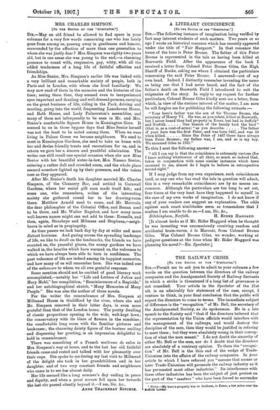A LITERARY COINCIDENCE.
[To THZ EDITOR OF THH "Srseraroa.1
Sin,—The following instance of imagination being verified by fact may interest students of such matters. Two years or so ago I wrote an historical romance which has recently appeared under the title of "Fair Margaret." In that romance the name of the hero is Peter Brome. The father of this Peter
Brome is represented in the tale as having been killed at Bosworth Field. After the appearance of the book I received a letter from Colonel Peter Brome Giles, the High Sheriff of Bucks, asking me where I obtained the particulars concerning the said Peter Brome. I answered—out of my own head. Indeed, I distinctly remember inventing the name as being one that I had never heard, and the fact of the father's death on Bosworth Field I ,introduced to suit the exigencies of the story. In reply to my request for further particulars, Colonel Brome Giles kindly sent me a letter, from which, in view of the curious interest of the matter, I am sure he will forgive me for publishing the following extracts :—
" Your hero's father was the son of Sir Thomas Brome, the secretary of Henry VI. He was, as you relate, killed at Bosworth, but I never heard they had property in Essex, but had in Suffolk"
and Norfolk One branch of the family took the bird" (that is, as a coat-of-arms) "as you describe. . . . . . The father of your hero was the first Peter, and was born 1437, and was 50 when killed. . . . . . Since the Peter of 1437 there have always been Peter Bromes ; my father was, I am, and so is my boy. We assumed Giles in 1761."
To this I sent the following answer :- "All I can say is that the coincidence is extremely curious (for I knew nothing whatsoever of all this), so much so indeed that, taken in conjunction with some similar instances which have occurred to me, almost do I begin to believe in retrospective second sight."
If I may judge from my own experience, such coincidences (and, as any one who has read the tale in question will admit, this is a very remarkable coincidence) are by no means un- common. Although the particulars are too long to set out, four times at the very least have they happened to myself in the case of my own works of imagination. I do not know if any of your readers can suggest an explanation. The odds against such exact similitudes seem so tremendous that I confess I am unable to do so.—I am, Sir, &O., [It almost looks as if Mr. Rider Haggard when he thought he was inventing was unconsciously receiving random and accidental brain-waves, a la Marconi, from Colonel Brome Giles. Was Colonel Brome Giles, we wonder, working at pedigree questions at the time when Mr. Rider Haggard was planning his novel ?—ED. Spectator.]










































 Previous page
Previous page